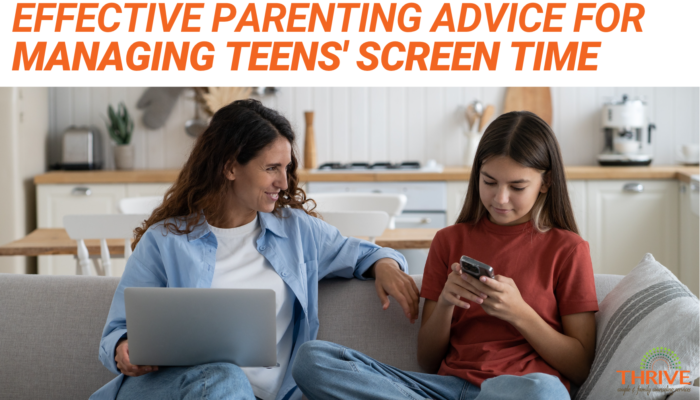As a parenting counselors that work with a wide range of clients, one of the most common challenges we talk about with parents and teens alike is managing teens’ screen time.
Parents often have questions like these about managing teens’ screen time:
- How much screen time is too much?
- When should devices be taken away?
- What is social media doing to my teens?
It’s normal to wonder about these things when managing your teen’s screen time. In addition to these worries, managing teens’ screen time can be confusing and hard to keep up with. This is especially true when you are dealing with one generation who did not grow up with much screen time and one that was exposed to the entire online world from a very early age.
We may be aging ourselves a bit, but in our day, we spent most of our free time as a child riding bikes, playing in nature and randomly appearing on friends and neighbor’s doorsteps to see if friends could play.
Teens today live in a very different world. In many places it is not very safe to allow teens to freely roam outside of their neighborhoods. It is no longer socially acceptable to just show up at someone’s house without having plans already made.
Using screens is now a daily part of life, and we’re still learning about the ways that it impacts us. Teens who grew up online have a very different relationship with screens than those of us who didn’t. Managing teens’ screen time is something that all parents now have to think about.
What are the pros and cons of screen time for my teen?
Positive aspects of screen time for teens
- Increased social connection to peers
- Video games can challenge minds, build prosocial skills and help with identity development
- The internet can be used to explore interests and gather information
- Social networks provide community spaces for different identities
- Social media and networking skills are needed in many career paths
- Increased ability to stay connected to distant family and friends
Negative aspects of screen time for teens
- Too much or too little screen time has been correlated to poor mental wellbeing
- Notifications and blue light can affect sleep quality
- Cyberbullying and online predators are a real threat
- Unrealistic body images are perpetuated through social media and filters
- Digital communication leaves out important facial and body cues and can lead to miscommunication
- It is difficult to monitor or protect your child from unwanted interactions or inappropriate media online
Managing teens’ screen time often means walking a fine line
Many teens I work with have reported acknowledging that they are on their phones too much or rely on screens too much. However, they also state that being online is often the only way they get to interact with friends outside of school.
Most households today need to have two incomes, so both parents are often working full-time. This means that teens are often in after school activities or without access to transportation most of the time. It’s hard to have a social life without access to transportation while also navigating multiple schedules around after school activities.
We know that developing people need social interaction to grow. As Emotionally Focused Therapists, we recognize that humans intrinsically need connection. It’s part of our wiring to seek relationships with other people. Teens especially rely on their peers to help them with understanding where they fit in with the world.
Your teens may seem glued to their phone because they are trying to get the social interaction they need in a world that is primed for disconnection.
Social interaction and a feeling of belonging needs to extend beyond family for healthy development. This is why social media is so important to teenagers. This is also why taking it away or over controlling it can cause outbursts, sneaky behaviors and arguments.
Understanding why social media is important to your teen can help you lead with compassion while managing teens’ screen time.
So, what should parents do to support healthy screen time for their teens?
Foster communication
Having honest, developmentally appropriate and open conversations with your teens regarding the risks and rewards of social media can go a long way.
Many parents can struggle with their own anxiety about giving their teenager access to the internet and all its wonderful and scary things. This can create a feeling of panic for you as a parent, which may feel invalidating to your teen and their social connective needs.
Utilizing your own emotional regulation strategies can help you react from a place of calm instead of from a place of panic. This will increase your ability to connect and validate your teen’s experience while educating them on boundaries and expectations.
Set expectations
Have clear boundaries and expectations regarding screen time and social media for your teen. Communicate what you expect and why with your teens and remember to validate and respond to their concerns.
Remember that social interaction is a developmental necessity. Most of the time, teens utilize talking to their friends as a coping strategy (which may seem terrifying, I know, but it is developmentally appropriate).
If you set specific times for screens, then stick to the schedule. Try to not make access to screens contingent on behavior unless the punishment is directly related to inappropriate screen usage. For teens especially, you don’t want to restrict their access to talking to their friends without giving them something to replace that developmental need.
Provide options for in-person social interaction
Provide and ask for ideas for non-screen time community and connection options.
These options can look like play dates for younger kids or dropping your teens off to hang out with friends at a safe public area.
Try using their interests to encourage in-person social connection. For example, if they like video games, maybe take them to an arcade or introduce them to board games. Many board game stores even hold community events to build social interaction in person.
Include them in the conversation
Lastly, include your child in the conversation around managing teens’ screen time. This will help them develop good boundary setting skills and teach them how to protect themselves while also developing self-esteem and a sense of self-efficacy.
Most importantly, teens need to understand why boundaries and expectations are set into place and the values associated with them.
Developmentally, teens are driven to develop their own identity and values as part of trying to figure out who they are as an individual. Allowing them space to think and talk about their own values regarding social media and screen usage gives them a sense of control.
When teens feel like they have some control over their lives and identity, and that you are a resource instead of the law, it makes them far less sneaky. They’re more likely to want to include you in the conversations regarding their identity, moral development and values.




